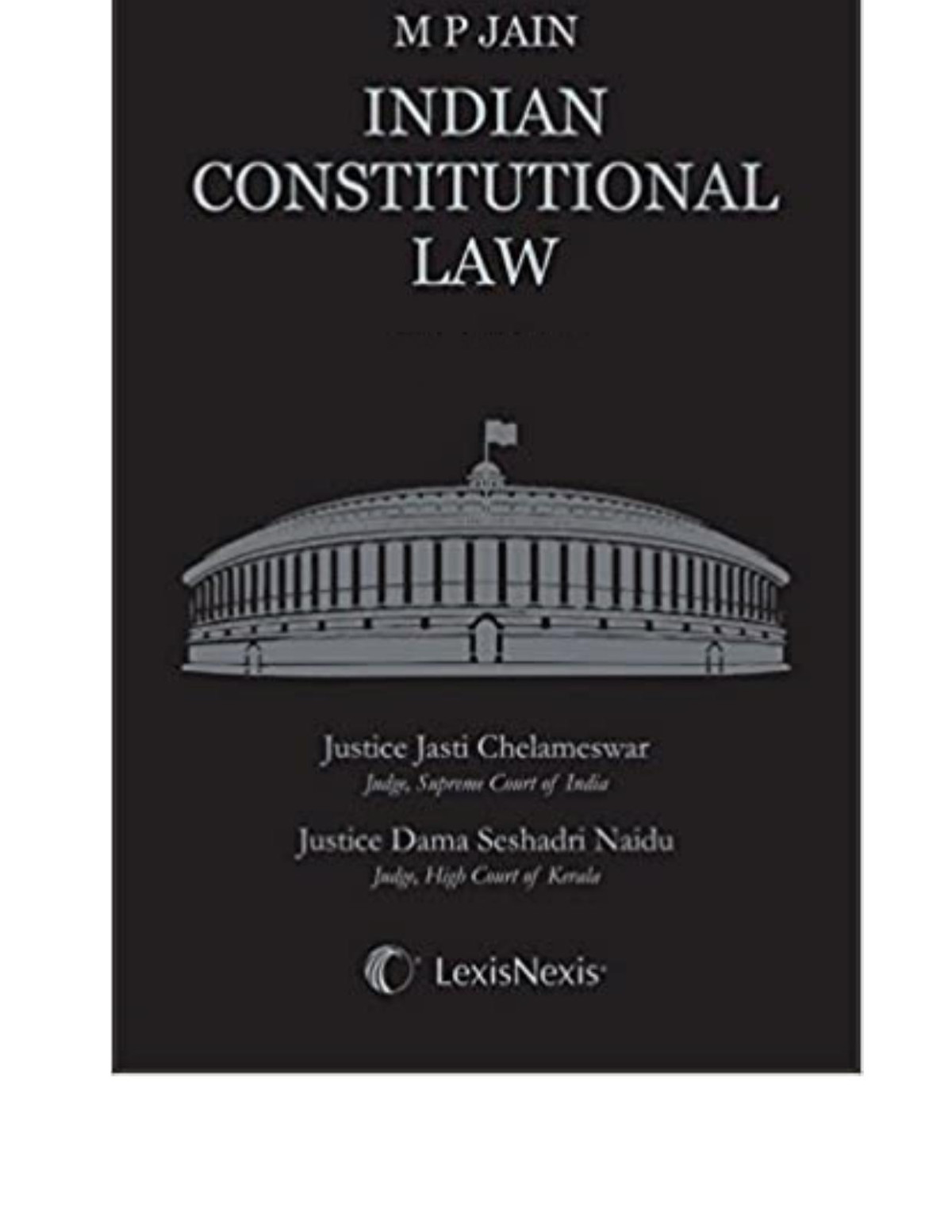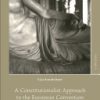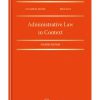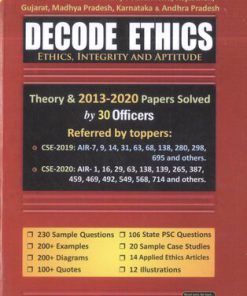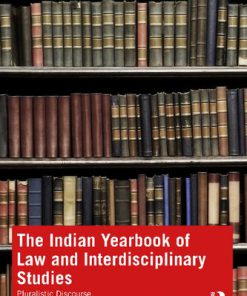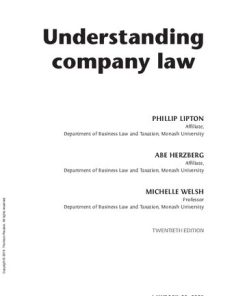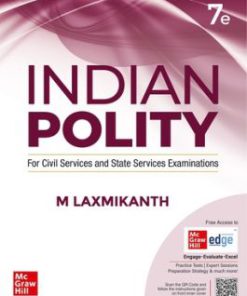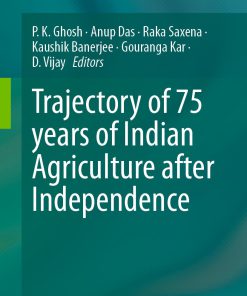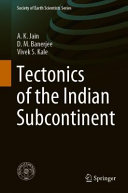Indian Constitutional Law 1st Edition by M P Jain ISBN 9386515040 9789386515049
$50.00 Original price was: $50.00.$25.00Current price is: $25.00.
Indian Constitutional Law 1st Edition by M P Jain – Ebook PDF Instant Download/Delivery: 9386515040, 978-9386515049
Full download Indian Constitutional Law 1st Edition after payment
Product details:
ISBN 10: 9386515040
ISBN 13: 978-9386515049
Author: M P Jain
Indian Constitutional Law 1st Edition: Reading books is a kind of enjoyment. Reading books is a good habit. We bring you a different kinds of books. You can carry this book where ever you want. It is easy to carry. It can be an ideal gift to yourself and to your loved ones. Care instruction keep away from fire.
Indian Constitutional Law 1st Edition Table of contents:
PART I: INTRODUCTORY
Chapter I: Introductory
-
A. Constitutional Law – Page 1
-
B. Constitutionalism – Page 6
-
C. Rule of Law – Page 7
-
D. Historical Perspective – Page 9
-
E. Salient Features of the Indian Constitution – Page 10
-
(a) Modern Constitution – Page 10
-
(b) Written Constitution – Page 11
-
(c) Preamble – Page 11
-
(d) Socialist State – Page 14
-
(e) Welfare State – Page 15
-
(f) Secular State – Page 15
-
(g) Responsible Government – Page 16
-
(h) Fundamental Rights – Page 16
-
(i) Minorities and Backward Classes – Page 17
-
(j) Elections – Page 18
-
(k) Judiciary – Page 18
-
(l) Federal Constitution – Page 19
-
-
F. Fundamental Law – Page 21
PART II: THE UNION
Chapter II: Parliament
-
A. Constitution of Parliament – Page 24
-
B. Composition of Rajya Sabha – Page 25
-
(a) House of Lords – Page 26
-
(b) Federations – Page 27
-
-
C. Composition of Lok Sabha – Page 28
-
D. Parliamentary Membership—Qualifications and Disqualifications – Page 29
-
(a) Office of Profit – Page 30
-
(b) The Parliament (Prevention of Disqualification) Act, 1959 – Page 37
-
(c) Joint Committee on Offices of Profit – Page 38
-
(d) Decision on Disqualification – Page 38
-
(e) Criminalisation of Politics – Page 43
-
-
E. Other Provisions regarding Parliamentary Membership – Page 44
-
(a) Simultaneous Membership – Page 44
-
(b) Termination of Membership – Page 44
-
(c) Committee on Absence of Members – Page 44
-
(d) Taking of Oath – Page 44
-
(e) Penalty – Page 44
-
(f) Salary – Page 45
-
-
F. Anti-Defection Law – Page 45
-
(a) Kihota Hollohon – Page 47
-
(b) Subsequent Developments – Page 49
-
-
G. Meeting of Parliament – Page 52
-
(a) Summoning – Page 52
-
(b) President’s Address – Page 52
-
(c) Power to Send Messages – Page 53
-
(d) Quorum – Page 54
-
(e) Decisions – Page 54
-
(f) Vacancy in a House – Page 55
-
(g) Language – Page 55
-
(h) Who Can Participate in the Proceedings of a House? – Page 55
-
-
H. Officers of Parliament – Page 55
-
(a) Speaker/Deputy Speaker – Page 55
-
(b) Chairman of Rajya Sabha – Page 57
-
(c) Parliamentary Secretariat – Page 57
-
-
I. Termination of Parliament – Page 57
-
(a) Prorogation – Page 57
-
(b) Adjournment – Page 58
-
(c) Dissolution – Page 58
-
(d) Effect of Dissolution on Business Pending in the House – Page 63
-
-
J. Functions of Parliament – Page 64
-
(i) Legislation – Page 64
-
(a) Procedure – Page 64
-
(b) Joint Session – Page 65
-
(c) President’s Assent – Page 66
-
(d) Private Members’ Bills – Page 67
-
-
(ii) Control of Public Finance – Page 68
-
(a) Four Principles – Page 68
-
(b) No Tax Without Authority of Law – Page 68
-
(c) Money Bills – Page 70
-
(d) Parliamentary Procedure in Money Bills – Page 70
-
(e) President’s Assent – Page 71
-
(f) Executive’s Responsibility in Financial Matters – Page 71
-
(g) Parliamentary Control on Appropriations – Page 72
-
Consolidated Fund – Page 72
-
Public Account – Page 73
-
-
(h) Expenditure Charged on the Consolidated Fund – Page 73
-
(i) Annual Appropriations – Page 74
-
(j) Appropriation Act – Page 75
-
(k) Finance Act – Page 75
-
(l) Votes on Account – Page 76
-
(m) Votes of Credit – Page 76
-
(n) Exceptional Grant – Page 76
-
(o) Supplementary Grants – Page 76
-
(p) Contingency Fund – Page 76
-
(q) Parliament’s Power to Regulate Financial Procedure – Page 77
-
(r) Borrowing – Page 77
-
(s) Comptroller and Auditor-General – Page 77
-
(t) Parliamentary Financial Committees – Page 79
-
Public Accounts Committee – Page 79
-
Estimates Committee – Page 80
-
General Features of the Two Committees – Page 80
-
-
-
(iii) Deliberation and Discussion – Page 80
-
(iv) Parliamentary Committees – Page 81
-
-
K. Interrelation of the Houses – Page 82
-
(i) Legislative Process (Other than Money Bills) – Page 82
-
(ii) Financial Legislation – Page 83
-
(iii) Other Areas – Page 83
-
(a) Impeachment – Page 84
-
(b) Removal of a Judge of the Supreme Court or a High Court – Page 84
-
(c) Election of the President – Page 84
-
(d) Election of Vice-President – Page 84
-
(e) Removal of the Vice-President – Page 84
-
(f) Control of the Executive – Page 84
-
(g) Amendment of the Constitution – Page 84
-
(h) Declaring a State Matter as National Importance – Page 85
-
(i) Presidential Ordinance – Page 85
-
(j) Declaration of an Emergency – Page 85
-
(k) Failure of Constitutional Machinery in a State – Page 85
-
-
(iv) Assessment of the Role of Rajya Sabha – Page 85
-
-
L. Parliamentary Privileges – Page 86
-
(i) Privileges Expressly Conferred by the Constitution – Page 87
-
(a) Freedom of Speech – Page 87
-
(b) Words Spoken Outside a House – Page 90
-
-
People also search for Indian Constitutional Law 1st Edition:
mp jain indian constitutional law
best book on indian constitutional law
indian constitutional law the new challenges pdf
indian journal of constitutional and administrative law
books on indian constitutional law
Tags:
M P Jain,Indian,Constitutional,Law
You may also like…
History & Research
Mathematics - Numerical Analysis
NUMERICAL METHODS FOR SCIENTIFIC AND ENGINEERING COMPUTATION 6th Edition M K Jain
Uncategorized
The Indian Yearbook of Law and Interdisciplinary Studies 1st Edition Ranita Nagar (Editor)
Commercial & Financial Law
Specific Relief Act Law India by A K Jain 2nd Edition Dr. Ashok K. Jain
Commercial & Financial Law
Politics & Philosophy - Government & Politics
Biology and other natural sciences - Plants: Agriculture and Forestry
Trajectory of 75 years of Indian Agriculture after Independence 1st Edition P. K. Ghosh

